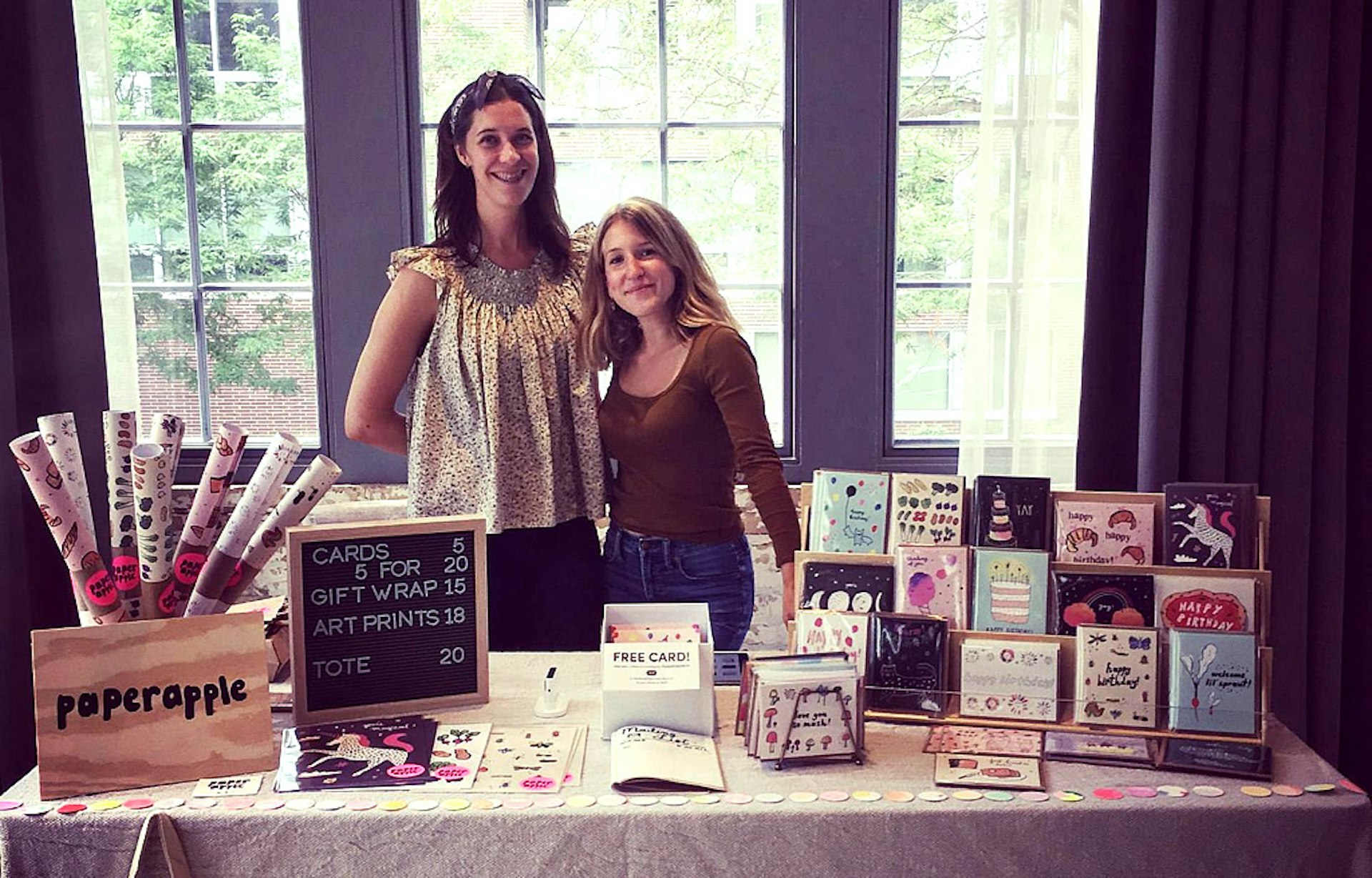For more than two years, a small design firm in Minneapolis that sells greeting cards, custom stationery, and notebooks has been fighting a legal challenge from an unlikely foe: the world’s most valuable company, Apple.
The two founders, Liz Apple and Natalie Helling, launched Paperapple in 2019—a play on Liz’s last name. The duo, whose whimsical paper-based products feature strawberries, flowers, and rainbows, filed for a trademark on the business logo that same year.
A few months later, they received a 283-page notice of opposition from lawyers for Kilpatrick Townsend & Stockton, one of Apple’s law firms. The notice contends that people buying Paperapple products—such as birthday cards with hand-drawn bugs and butterflies—are “likely to believe” the goods are “associated with, or approved, endorsed, or provided by Apple.” The two women were stunned.
“Why are they opposing us when we pose no threat?” Liz Apple said in an interview, describing the dispute's heavy financial and emotional toll. The tech giant, she said, has been “basically bullying us to drop our trademark.”
Their story is not unusual, according to a new investigation by the Tech Transparency Project (TTP). Apple has been targeting a range of small businesses and nonprofits across the country, often in unrelated fields, for potential trademark infringement. Among those targeted by Apple’s legal machine: an organization that supports families of children with autism, a school district in Appleton, Wisconsin, and an online test prep service for nursing students.
Small businesses hit with an Apple trademark challenge face some grim choices. For those that choose to fight, the legal bills can rack up quickly—not an easy option for organizations with limited resources. Many choose to simply give up rather than take on a mega-corporation with a market value of $2.5 trillion, but in doing so, they lose whatever funds they invested in designing their logo and hiring a lawyer to deal with the trademark application.
TTP’s investigation found that Apple’s trademark aggression is unparalleled in the tech industry. Over a three-year period, Apple filed 215 trademark oppositions, more than Amazon, Google, Microsoft, and Facebook combined (136). (The totals include Apple's Beats Electronics, Google's YouTube, and Facebook's Instagram and WhatsApp, now under corporate parent Meta.) It’s not clear what Apple gains from this behavior; the other tech giants also hold a variety of trademarks based on common words like Prime, Windows, Nest, and Ring, but aren’t nearly as litigious.
Apple’s unyielding trademark stance against so many mom-and-pop businesses and tiny nonprofits appears to be at cross purposes with the company’s efforts to cultivate small business customers. CEO Tim Cook has hailed small businesses as an “essential part of our economy,” but Apple’s bulldog legal strategy on trademarks tells a different story about the company’s priorities.
Going after teachers
TTP examined public records in 215 cases filed by Apple at the Trademark Trial and Appeal Board (part of the U.S. Patent and Trademark Office) between January 1, 2019, and December 31, 2021. We then focused on the 118 cases involving applicants from the U.S. or Canada.
The cases show that Apple doesn’t just pursue trademark challenges related to its famous consumer products and software. TTP found that in more than two-thirds of the 118 cases, Apple targeted companies that offered products and services in unrelated fields, from medical services to jewelry to plumbing; presented no clear commercial threat to the iPhone giant; or featured logos that bore no resemblance to the iconic Apple logo.
Apple has been particularly aggressive on trademarks in the field of education, where many organizations adopt the apple symbol due to its longtime association with teachers and learning. Nearly 20% of the cases examined by TTP related to the education field.
Take 3.14 Academy, a Maryland-based nonprofit that provides children with autism, their families, and communities with educational initiatives and training. In July 2019, founder Celeste Chamberlain, an autism specialist and the mother of two autistic children herself, filed what she thought would be a routine trademark application for her academy’s logo, featuring the Greek letter pi inside an apple.

3.14 Academy’s logo as it appeared in the trademark application.
But Apple’s lawyers intervened. In a 257-page filing opposing Chamberlain’s application, Apple argued that it is deeply involved in education due to the fact that, among other things, it has donated iPads and Mac computers to schools, offers educational apps in its App Store, and makes GarageBand available to music teachers. Therefore, the filing argued, 3.14 Academy’s logo was “likely to cause confusion, mistake, or deception in the minds of consumers.”
In an interview with TTP, Chamberlain said that she and her lawyer were initially baffled by Apple’s opposition to her trademark and thought the company and its legal team would quickly realize it was all a big mistake.
But she said she eventually recognized that she could not afford a legal fight and had to give up. Fees for the graphic design of her logo and legal expenses totaled well over $10,000, according to Chamberlain, who was funding the nonprofit herself.
“$10,000 to a big company is a drop in the bucket,” she told TTP, but “this was $10,000 coming out of my own checking account.”
Latrina Walden, who runs a business providing test preparation for nurses, described a similar experience.
Walden filed to trademark a logo featuring a heartbeat and an apple in May 2019—a design representing her role as both a nurse and a teacher of nursing. A few months later, Apple began filing extensions for time to oppose the application, signaling potential action by the tech giant.

Sensing trouble, Walden and her lawyers amended her application to specify that the logo covered online test prep solely for nursing certifications. But Apple’s law firm filed an opposition anyway in March 2020—even as the spread of COVID-19, which created new demand for nurses, made headlines around the world.
At that point, Walden said, her lawyers were frank with her: She could not afford to fight Apple.
“I’m the little guy,” Walden told TTP, “and Apple’s the big guy.”
With negotiations yielding little progress, she said she was forced to default on her trademark application. In March 2021, however, Walden filed a separate logo, adding another leaf and a stem to the original design, hoping it would avoid an Apple objection. In the end, Apple didn’t challenge the new logo, but Walden estimates the dispute cost her between $7,000 and $10,000 in legal and design fees.
Below are some other education-related organizations that drew the wrath of Apple:
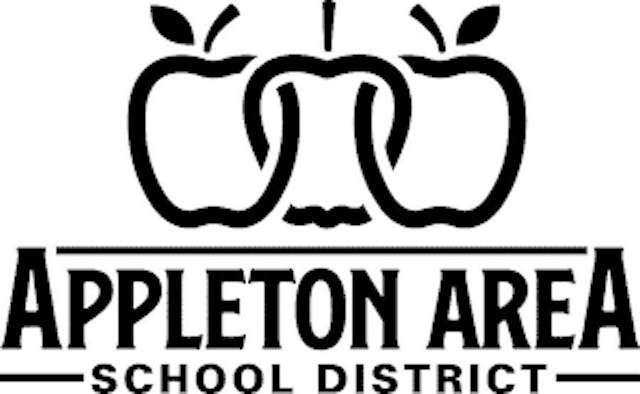
In January 2020, Appleton Area School District, the public school district of Appleton, Wisconsin, filed for the above logo. Apple made its opposition known that July. The two parties entered discussions the following month but no agreement could be reached; Appleton withdrew its application in September.
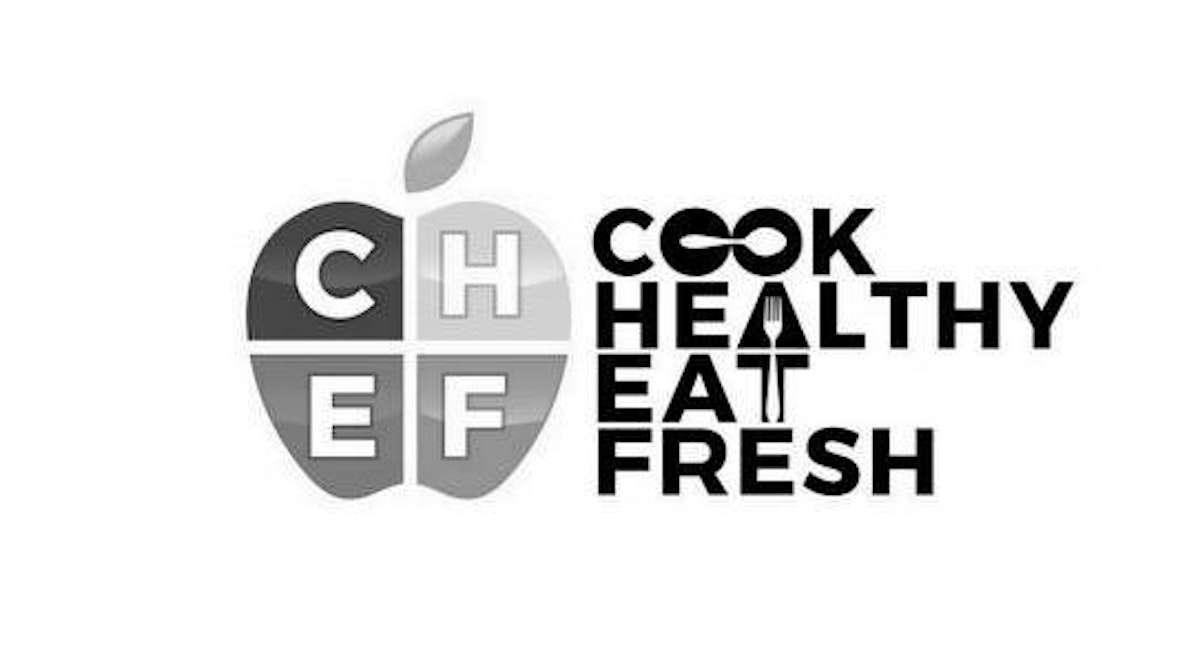
Cook Healthy Eat Fresh is a nonprofit that focuses on teaching children about cooking and nutrition. In 2021, it filed the above logo for use in education, specifically in the areas of “agriculture, healthy cooking, nutrition, dining etiquette, culinary arts, global cuisine, wellness, and entrepreneurship.” Cook Healthy Eat Fresh defaulted, granting Apple another victory.
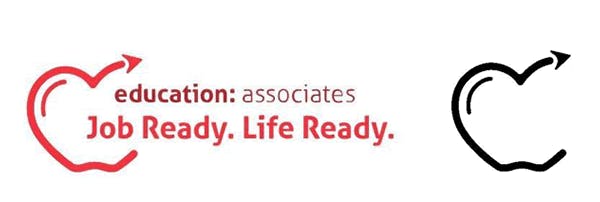
Education Associates, Inc., is a company in Kentucky that produces educational materials for at-risk and special needs students to help with career development and adult independence skills, according to its filing. Apple has been opposing the application of both logos since January 2020, and the companies have been in negotiations for over a year.
Steamrolling the little guys
Apple was not always like this. From 1980 to 1999, according to the USPTO database, the company filed a grand total of 37 trademark oppositions, an average of less than two per year. But in the early 2000s, Apple’s strategy began to change.
After filing zero cases in 1998 and 1999, Apple filed 4 in 2000—and 15 the next year, followed by 27 in 2002 and 28 in 2003, remaining at that level or higher almost every year since.
Apple’s aggressive trademark behavior has been consistent across two different law firms providing outside counsel, suggesting that Apple itself, not the law firms, has been the driving force behind the legal strategy. Apple used Fenwick & West when it began ramping up trademark oppositions in the early 2000s. (Apple hired its current legal director, Thomas La Perle, from Fenwick in 1999.) Apple is today represented by another law firm, now known as Kilpatrick Townsend & Stockton, which has kept up the same tactics for the past 15 years.
Apple’s strategy is not restricted to the United States. Though trademark case records in other countries are not always available or complete, TTP found recent examples of Apple opposing apple-based trademarks abroad, including those of a political party in Norway, a bike path in Germany, and a health writer in Australia, as seen below.

The Melbourne Health Writer filed a trademark (left) in Australia in September 2020. Apple opposed, and the applicant decided to defend her case instead of being “intimidated by a global tech giant.” Months later, Apple agreed to allow the trademark if the direction of the leaf was switched (right).
Of the 118 North American cases analyzed by TTP, 76 have been decided in Apple’s favor, with a complete defeat of the other parties’ proposed logos or trademarks. None of these cases saw a full trial before TTAB but were withdrawn or abandoned by the applicants amid Apple’s pressure. A total of 26 cases are still ongoing. Another 11 applications were allowed to proceed after making alterations to their trademarks, often after months or even years of negotiations with Apple. Four cases were rendered moot due to erroneous filings by Apple or, in one instance, Apple’s acquisition of a trademark in question.
Apple appears to have been stopped in only one instance: when it challenged the U.S. government. The Department of Energy registered an online research service called Pages in 2020. Apple owns the trademark Pages for its word processor and opposed the agency’s trademark on those grounds. The Department’s response was brief, and its main defense took the form of a one-sentence declaration: “There is no likelihood of confusion, mistake, or deception between [Apple’s] marks and DOE’s PAGES mark.” After more than a year of negotiations, Apple agreed to withdraw its objections, without DOE making any change to its application. In TTP’s dataset, no other applicant was able to completely beat back Apple.
The alterations demanded by Apple in these trademark cases can border on the absurd. In a case that garnered international media attention, Apple objected to a pear-shaped logo for the nutrition company Super Healthy Kids, Inc., arguing that the “minimalistic fruit design with a right-angled leaf … readily calls to mind Apple’s famous Apple Logo.” As part of a settlement in February 2021, Super Healthy Kids agreed to modify its pear logo to give the leaf a different shape.
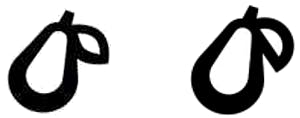
The Super Healthy Kids logo before (left) and after (right) negotiations with Apple.
It’s not the only example of Apple going beyond the apple to oppose other fruit trademarks. Other targets include oranges and pineapples.
For example, Apple opposed singer-songwriter Franki Pineapple’s attempt to trademark her name, but withdrew the challenge 15 months later after she agreed to make amendments, namely by appending “by the musical artist Stephanie Carlisi, under her stage name Franki Pineapple” to the description of goods and services.
Apple also filed a challenge to the trademark application of Pineapple Live, a live music entertainment event company. Apple argued that “[a]lthough the word ‘apple’ and ‘pineapple’ refer to different fruits, they are both a type of fruit, and thus convey a similar commercial impression.” Pineapple Live withdrew its trademark application in December 2021.
In December 2020, as New York saw coronavirus cases surge, a New York City-based company tried to register a logo for a contactless delivery app. It consisted of a stylized picture of a fruit that might be interpreted as an apple—were it not for the large word “Citrus” underneath. Apple successfully shot down the application.
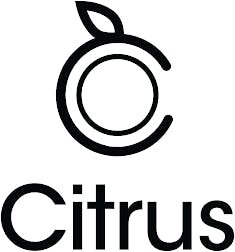
Music interventions
The indie band Applewhite is one of many musical groups that have run into trademark opposition by Apple. The band filed for protection of its name after being forced to abandon its previous name, The New Rituals, due to trademark infringement claims by another company.
Apple objected to the band’s trademark application in March 2020, saying it could cause confusion because of Apple Music and Apple-sponsored live concerts. Those associations could give people the false impression that Applewhite’s music was somehow made by or affiliated with Apple, Apple’s lawyers argued. (Apple does not release music under its own name, and Apple Music carries artists like Fiona Apple, suggesting the company is not always concerned with the music being mistaken for an Apple product.)
Applewhite band member Carl McBeath, who said he was unable to afford a lawyer, filed a response to Apple himself, but it was rejected by the trademark board for procedural violations. For example, USTPO rules state that only people in the United States can file on behalf of themselves, but McBeath resides in Canada.
McBeath told TTP that he would have loved to hire a lawyer and fight Apple if the band had the resources, but ultimately, “We’re nobody and they're Apple. They have all the resources in the world to keep going at this — who the hell am I?"
Instead, he said, the band had no choice but to default and give up the trademark.
Candy Apple Blue is another music group that faced off with Apple over a trademark. The Pennsylvania electropop duo of siblings Carly and Hoyt Emerick, who have used the name Candy Apple Blue for a decade, engaged in a lengthy battle with Apple over their trademark application.
Apple’s lawyers maintained that “candy” and “blue” “do little to distinguish Applicants’ CANDY APPLE BLUE Mark from the Apple Marks (e.g., ‘candy apple’ is simply an apple coated with candy).” Candy might just mean “music that is sweet or sentimental” while blue signals music “perhaps tinged with sadness,” the lawyers continued, arguing that “an appreciable number” of listeners “are likely to conclude that it signifies a sub-label and/or collection of music offered by Apple thereby rendering confusion all but inevitable.”
In November, after two years of negotiations, Candy Apple Blue finally settled, according to TTAB records. The band had to strip references to downloadable audio recordings of their music and music videos from their application, meaning Candy Apple Blue cannot claim an MP3 of its music is protected by the band’s trademark
Inconsistent approach
TTP’s investigation also turned up seemingly arbitrary choices in Apple’s trademark challenges.
For example, Apple raised no objections to “AppleSeed,” a trademark registered in 2012 by an Illinois-based Christian youth nonprofit, despite the fact that it covers digital goods like downloadable audio and video. (Apple filed for an extension of the window to file in the case but never acted.)
But Apple last year objected to a trademark application for a nearly identical term—“Apple Seed”—filed by the director of an Arkansas nonprofit called The APPLE Group, which teaches dyslexic children how to read. This application for Apple Seed makes no mention of electronics, software, or any sort of digital good. The dispute is ongoing.
Meanwhile, Apple is intervening to stop toy company Mattel from registering a trademark for its game Apples to Apples. (The trademark already exists for the physical card game; Mattel is re-filing to include an online version under the trademark).
Oddly, though, Apple did not oppose the “Apples to Apples” trademark of an Idaho company that distributes food to the needy. A charitable interpretation might be that Apple recognizes that charities are not a threat. But in 2019, Apple succeeded in quashing the trademark application of a Minnesota company that engages in “Charitable fundraising services by means of sharing profits from sale of real estate with schools.” Apple asserted that the company’s Amped Apple logo would harm nine of its own trademarks, including Apple Pay, because “APPLE PAY is available, and promoted by Apple, for use in charitable fundraising.”
In another example of Apple’s inconsistent approach, the iPhone giant didn’t act when a company in Utah registered the name Red Apple Solutions in 2019 for “insurance brokerage in the field of education.” But in November 2021, Apple filed a challenge to Wicked Apple Concepts, a business consulting boutique that sought to trademark its name, according to the filings. The founder of Wicked Apple Concept’s surname is Appleton.
TTP’s analysis turned up other oddities in Apple’s trademark filings. In 2020, for example, more than two-thirds of Apple’s filings came after the deadlines mandated in TTAB rules. In theory, this means they should not be accepted by the board, but the company was never sanctioned.
Apple filings, which frequently use the same boilerplate language, often included outdated or mistaken information. For example, the company, in challenging education-related trademarks, regularly cited iTunes U, its educational content platform, as evidence of its online educational services. But Apple continued to note iTunes U in filings for more than a year after it announced plans to shut down the service at the end of 2021.
Apple continued to cite its iBooks Author software in the same context, even after the software was discontinued and removed from the App Store in July 2020.
